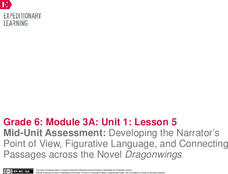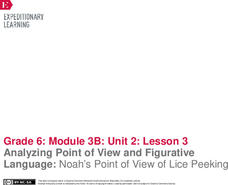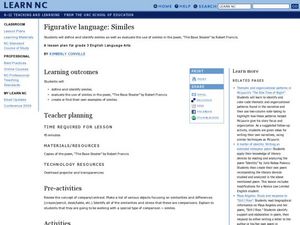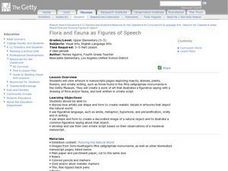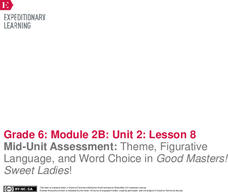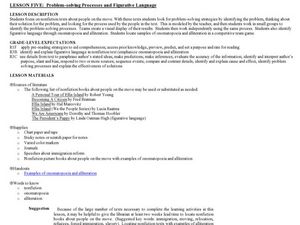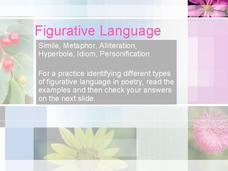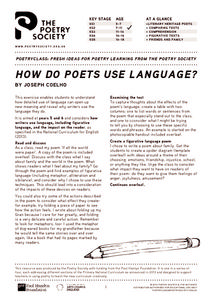EngageNY
Mid-Unit Assessment: Developing the Narrator’s Point of View, Figurative Language, and Connecting Passages across the Novel Dragonwings
Let's get creative! As part of a mid-unit assessment, scholars create a piece of artwork illustrating the theme from Laurence Yep's novel, Dragonwings. Additionally, pupils use a graphic organizer to identify figurative language in the...
EngageNY
Analyzing Point of View and Figurative Language: Noah’s Point of View of Lice Peeking
Read along with me. Two learners read the parts of Noah and Lice in Flush as the rest of the class follows along. Readers look for unfamiliar words and the use of figurative language in the text. They complete graphic organizers and...
Curated OER
Figurative Language Similes
Learners illustrate a simile. In this figurative language lesson plan, second graders are introduced to similes. They read the story Quick as a Cricket and talk about the similes used. Everyone chooses a simile and draws a picture to go...
Curated OER
Figurative Language
What is figurative language, and why do we use it? Introduce your high schoolers to some examples and discuss the importance of including this element in your writing. After studying a text and searching for examples, writers will...
Curated OER
The Use of Language in "I Know Why the Caged Bird Sings"
Readers of I Know Why the Caged Bird Sings are asked to craft an essay in which they compare how Maya Angelou uses figurative language to depict herself and Mrs. Flowers.
Fly Parsons
Crispin: Figurative Language Activity #1
As part of a study of figurative language Avi uses in his book, Crispin, individuals define the 10 terms listed on the learning exercise and then locate severals examples of each in the text of the novel.
Curated OER
Flora and Fauna as Figures of Speech
What a lovely way to incorporate artwork into your language arts lesson. View artwork in illustrated manuscript pages, depicting insects, animals, plants, flowers, and ornate writing in the Getty Museum. Practice using figurative...
EngageNY
Mid-Unit Assessment: Theme, Figurative Language, and Word Choice in Good Masters! Sweet Ladies!
Time to show what you know. Scholars complete a mid-unit assessment to demonstrate their learning from the past lessons. Learners work independently to identify the theme and answer questions about Pask, the Runaway. They also examine...
Curated OER
Focus on Figurative Language
Using the poems "First Snow" by Ted Kooser and "Eating Alone" by Yi-Young Lee (or other suggested poems by Robert Frost or Sara Teasdale), middle schoolers search for examples of figurative language. Guide your learners by discussing...
Curated OER
Problem-Solving Processes and Figurative Language
Nonfiction texts about people on the move provide young readers with an opportunity to examine not only the problem-solving strategies employed by immigrants, but to also find examples of figurative language these writers use to tell...
Curated OER
What is Figurative Language?
Need a review of literary terms and figurative language? Although text heavy, these slides clearly define frequently used terms and provide color-coded examples.
Curated OER
Figurative Language
Review and discuss literary devices using this resource, a PowerPoint about personification, simile, and metaphor. Learners can talk about metaphors, similes, and personification. This could a part of a more in-depth discussion of these...
MENSA Education & Research Foundation
Magical Musical Tour: Using Lyrics to Teach Literary Elements
Language arts learners don't need a lecture about poetry; they listen to poetry every day on the radio! Apply skills from literary analysis to famous songs and beautiful lyrics with a lesson about literary devices. As class...
Curated OER
The Study of Theme and Figurative Language in Poetry and/or Prose
Identify and analyze the use of figurative language used in select pieces of writing. These pieces of literature will represent at least two pieces by one writer and at least two pieces by different writers. This lesson plan would be a...
Curated OER
Figurative Language
Have your kids read twelve sentences and underline figurative language in each sentence. They will better grasp connotative and denotative language by rewriting the sentences with the same meaning omitting the figurative language.
La Jolla High School
Of Mice and Men by John Steinbeck: In Search of Figurative Language
While this resource was originally made to be used in conjunction with John Steinbeck's Of Mice and Men, it could be used for any literary text. A reference sheet for readers, the resource includes terminology related to figurative...
Curated OER
Figurative Language
I have a pair of ducks; one can’t swim. Viewers are introduced to several literary terms (paradox, oxymoron, pun, irony, etc.) that are defined and illustrated with examples. Then they are asked to identify the figurative language used...
Curated OER
Circle the Simile
Figurative language is a welcome addition to creative writing. Clearly describe similes with this worksheet. For each of 10 example sentences, learners have to identify what is being compared. An answer key is provided with this great...
Hamilton Schools
Figurative Language
What's the difference between a simile and a metaphor? Show language arts learners a presentation that identifies different types of figurative language used in poetry.
K12 Reader
Working with Figurative Language
Are your middle schoolers able to identify the literary devices featured on this worksheet? They must demonstrate their understanding of figurative language by matching the terms with their definitions and label the devices used in short...
K12 Reader
Figurative Language: What Is It?
"Lucky lady." "Straight as an arrow." Here's a figurative language learning exercise that provides middle schoolers with six examples and asks them to identify the literary device modeled.
K12 Reader
Using Similes
Your class will find using similes as easy as pie after completing this figurative language exercise. Provided with a list of incomplete similes, young writers must use their creativity to fill in the blanks with nouns that accurately...
Roald Dahl
Matilda - Miss Honey and The Trunchbull
As the instructor reads aloud several quotes from five chapters of the story Matilda, class members mime their interpretation of the scenes. Then, after reading "Miss Honey" and "The Trenchbull" (chapters seven and eight), the class...
Poetry Society
How do Poets Use Language?
Why do writers choose the language they do? Here's a resource that has the poet himself answer that very question. Joseph Coelho explains why he chose the words and images he used in his poem, "If All the World Were Paper."


